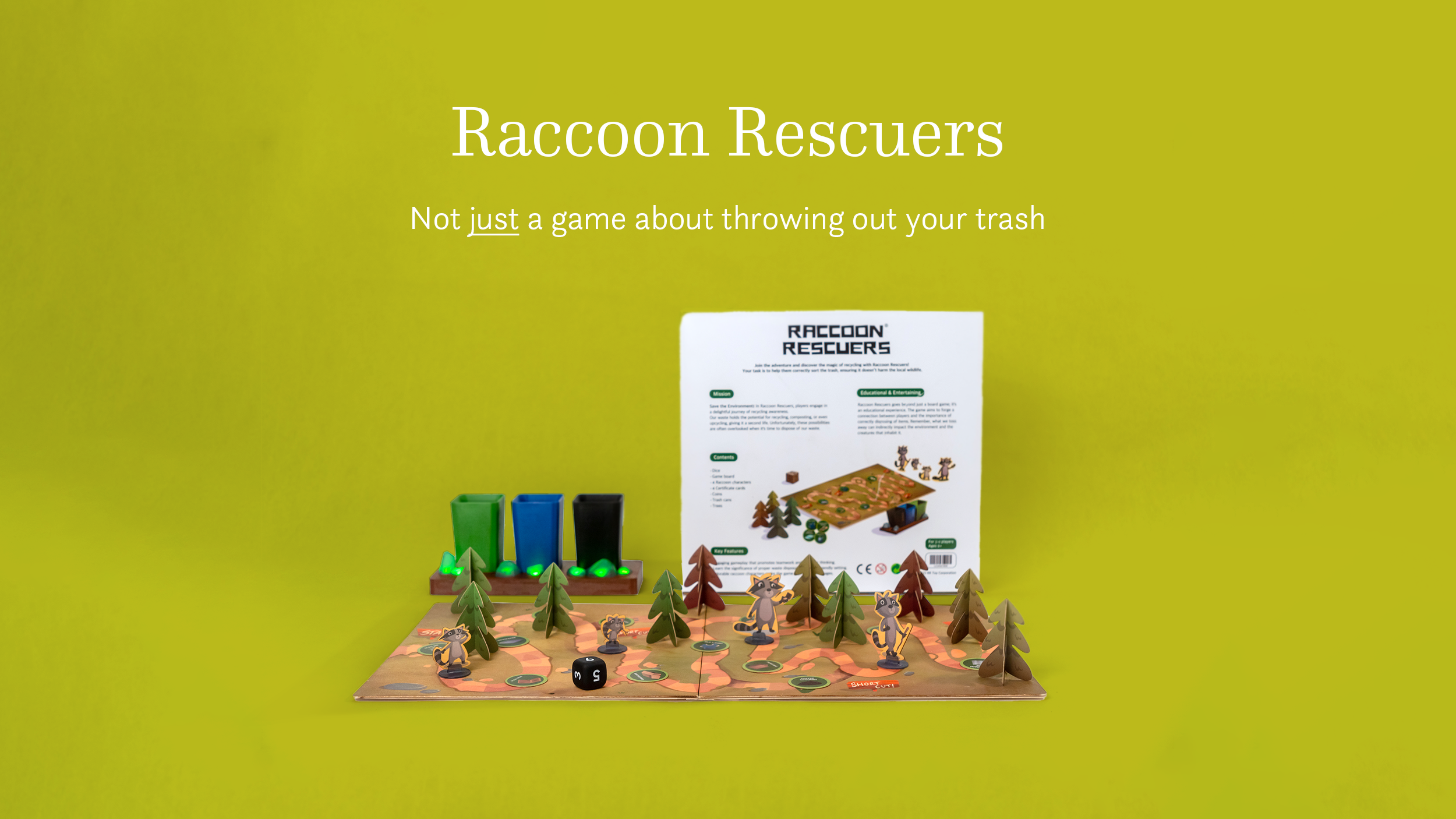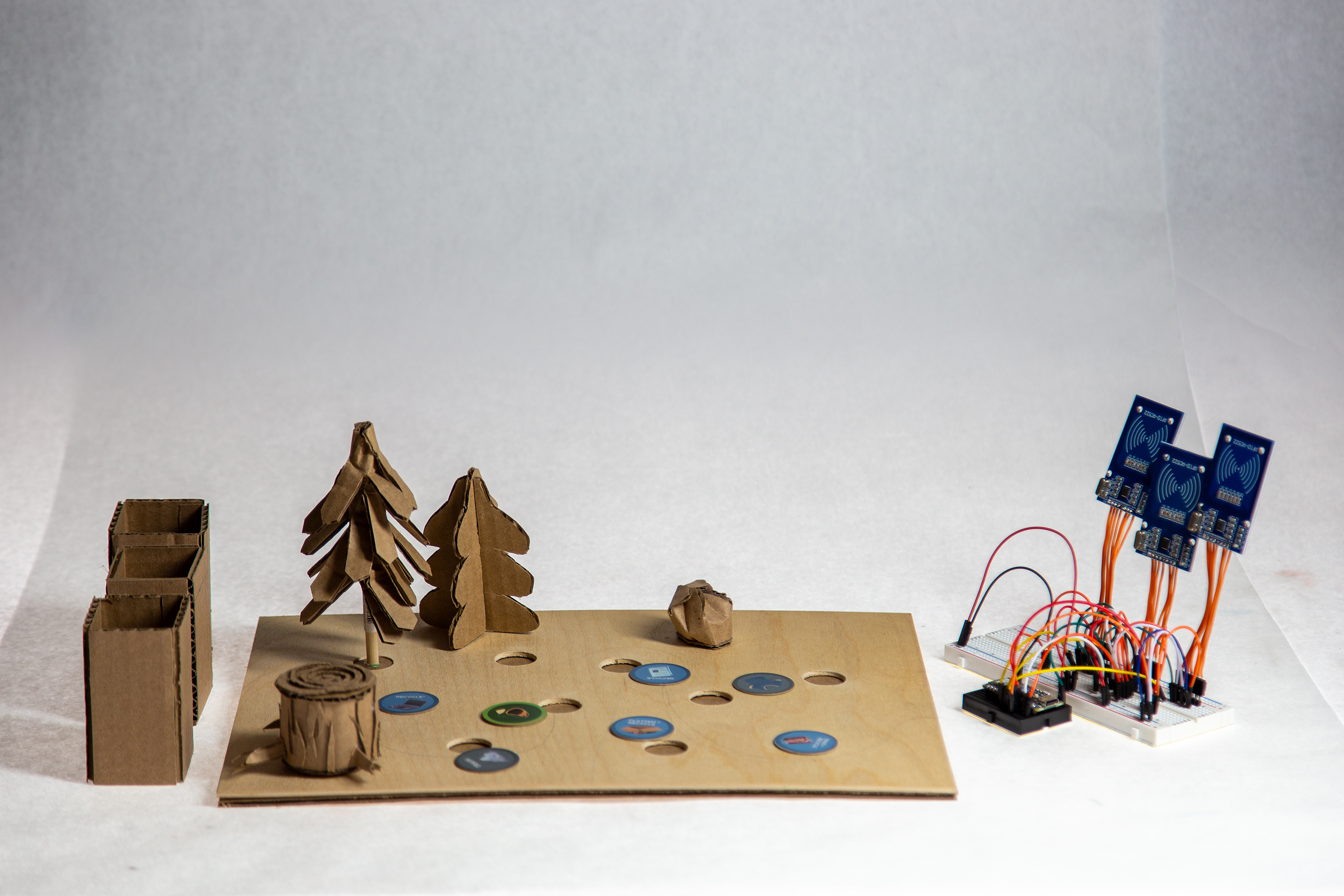
A trash sorting game that promotes sustainability over a use and throw mentality.
Raccoon Rescuers is a 2-4 player game where players help a family of raccoons clean up a campsite and in the process learn about not just correctly sorting your waste but also coming up with ways to reuse or repurpose items that would otherwise be thrown away.
Project Details
Duration: 2 months (October 2023 - November 2023)
Team:
Hanbyul Lee ‘25 (Industrial Designer)
Sanghyuk Seo ‘25 (Industrial Designer)
Sunny Satpathy ‘24 (Visual Development)
My Role
Research
Game Concept Development
2D Illustrations (Characters, Board, Tokens)
Packaging Design (Illustrations)
Tools
Adobe Photoshop
Adobe Illustrator
UV Printing
Laser Cutting
3D Printing
Arduino
Let’s be real…trash sorting is both complex and mundane and many have tried to gamify this experience.
Each U.S. state has unique waste management protocols, for example pizza boxes are marked recylable in Rhode Island but in California depending on the county, they are considered compost. Complicated right?
Our market research into existing trash sorting games found that most trash sorting games focus on speed and didn’t have a check for accurately sorting the waste.
Raccoon Rescuers combines tech, storytelling and game mechanics to emphasise correctly sorting and repurposing items.
Making the very mistake I was trying to avoid: oversimplifying
During playtesting, we found that instant feedback on correct or incorrect sorting eliminated ambiguity and fostered a sense of accomplishment. To support this, we introduced double-sided, color-coded coins: blue for recyclables, black for trash, and green for compost. One side displayed the trash item, while the other identified it as trash, recycle, or compost.
This ended up making things too basic and created a predictable game.
Initial colour coded design of the trash tokens
To maintain complexity while providing clear feedback, we brainstormed ways to incorporate light or sound to enhance gameplay excitement. This led us to the idea of having the trashcan light up, adding a dynamic and engaging element to the experience.
Taking advantage of RFID technology
Raccoon Rescuers features 64 uniquely illustrated trash icons. Shown here are 32 tokens that were designed for the live demo
We created a list of items focusing on ones that have different materials and non-conventional disposal practices. I worked on the illustration for the tokens while Sanghyeok worked on the integrating the RFID scanners into the trash can designs.
Everybody wants to be a hero…not necessarily a student
A game thrives on immersion, and educational games often struggle to balance entertainment and information. To make players feel like heroes, we focused on creating a compelling world and characters.
Knowing that animals appeal to our target age (8+), I sketched a raccoon family arriving at a trash-covered campsite. This mission-driven story introduces players to the characters, board setup, and game mechanics.
Initial sketches of the raccoon family, early prototypes and the storyboard
Using the story to not only set-up the game but also break down the takeways for the game
Transforming the board to show the individual impact at a meaningful scale
Games and gameplay mechanics for an educator allow a level of expectation warping that can be used to drive home key messages in an impactful manner. We used the motif of trees and the idea of transforming the landscape of the board from a barren trash filled campsite to a lush forest to show the power of action. Each time a player correctly sorted a trash item they were awarded a tree to place in that spot.
Laser cutting the trees that transform the boardgame
“Save” mechanic to save the game from becoming like the ones in market
The goal of Raccoon Rescuers was to teach waste disposal methods while encouraging waste reduction. We added a mechanic where players could save trash tokens by proposing alternative uses, earning extra points and reinforcing the message of saving over tossing.
Sustainability isn’t just a theme for us. Raccoon Rescuers walks the talk, right down to its material choices
Making a game about trash only means so much if we generate more trash while manufacuturing. With this in mind, we conducted a quick OKALA, Life Cycle Assessement (LCA) of the materials we used to make the prototype and plan to use in the final product.
Ready, set and let’s play Raccoon Rescuers!
Projects like Raccoon Rescue are only as successful as the follow through actions they inspire. We included ID badges as a reward for finishing the game and in it included resources urging players to look up local waste management policies.
















